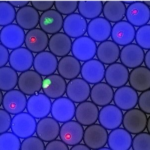Présentation
Netosis consists of the ejection of DNA filaments by activated neutrophils resulting in extracellular DNA (Neutrophil Extracellular Traps, NETs). This DNA has antimicrobial properties but is also toxic to surrounding tissues. NETs have recently been reported to participate in many pathologies such as cancer, thrombosis, or autoimmune diseases (especially lupus). At the molecular level, however, the phenomenon is still poorly understood. To tackle some of the open questions, notably the source and mechanism(s) of DNA ejection, this project aims to develop a micro-fluidic approach to monitor Netosis at the level of a single cell. Neutrophils will be encapsulated in a water-in-oil emulsion and analyzed using different fluorescent probes and time-lapse microscopy. The objective is to precisely establish the different characteristics of Netosis depending on the triggering stimulus and possibly to define different cell populations according to their functional response.


